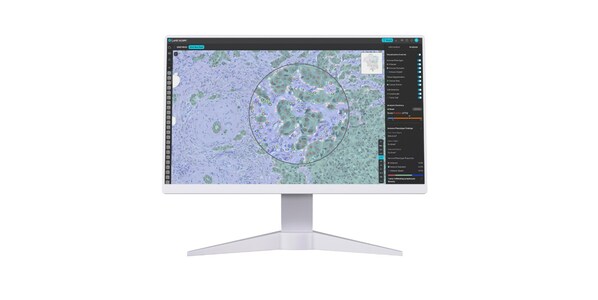 |
– 9 abstracts accepted by the ESMO annual meeting – unveiling insights into cancer analysis, immunotherapy response, and predictive biomarkers at ESMO 2023
SEOUL, South Korea, Oct. 10, 2023 /PRNewswire/ — Lunit (KRX:328130.KQ), a leading provider of AI-powered solutions for cancer diagnostics and therapeutics, today announced the presentation of 9 studies featuring its AI pathology research at the upcoming European Society for Medical Oncology (ESMO) 2023 Congress, scheduled to be held in Madrid, Spain, from October 20 to October 24, 2023.
This year’s collection of abstracts delves into multifaceted research, including the use of AI-powered analysis to predict treatment outcomes in different cancer types, assess HER2 expression in breast and biliary tract cancer, and streamline clinical workflows for treatment decisions in lung cancer, all utilizing the Lunit SCOPE suite.
The highlighted abstracts for ESMO 2023 include:
- Lunit investigates AI’s potential to predict multiple druggable mutations in non-small cell lung cancer from H&E stained images, paving the way for more efficient clinical workflows and treatment decisions.
- In a collaborative study, Lunit SCOPE IO distinguishes MMR-D (Mismatch repair deficiency) from MMR-P (Mismatch repair proficiency) colon cancers by analyzing features in whole slide images, offering insights with implications for prognosis and subtype-based interventions.
- Lunit evaluates the efficacy and safety of avelumab plus gemcitabine in leiomyosarcoma patients who failed first-line chemotherapy, demonstrating encouraging results in terms of response rates, duration of response, and overall survival.
- Analyzing HER2 expression with Lunit SCOPE HER2 in breast cancer cases proves effective in predicting FISH (Fluorescence In Situ Hybridization) positivity and therapy response, offering valuable insights for targeted therapy.
- In another study utilizing Lunit SCOPE HER2, Lunit assesses HER2 expression and TIL (Tumor-infiltrating lymphocyte) density in biliary tract cancer, providing valuable insights into the tumor microenvironment’s role in treatment strategies.
- Lunit’s AI-powered spatial analysis of TIL in advanced biliary tract cancer patients, who are planning to be treated with anti-PD-1 therapy, demonstrates the potential of immune phenotypes to predict therapy outcomes.
- Using Lunit SCOPE IO, a study explores the predictive role of immune phenotypes and Inflamed Score in metastatic colorectal cancer patients, providing insights into immunogenicity as a biomarker.
- Lunit’s AI-powered TIL density analysis in recurrent/metastatic head and neck squamous cell carcinoma patients treated with ICI reveals favorable treatment outcomes, especially in those with higher intratumoral TIL density.
"These groundbreaking abstracts showcase the power of the Lunit SCOPE suite in unraveling complex insights across various cancer types, from distinguishing tumor subtypes to predicting treatment responses," said Brandon Suh, CEO of Lunit. "We’re on our way towards making the Lunit SCOPE suite an essential biomarker for cancer immunotherapy – contributing to the advancement of personalized oncology through innovative AI solutions."
For inquiries or to schedule a meeting with the Lunit team, please contact oncology@lunit.io.
###
About Lunit
Lunit is a deep learning-based medical AI company on a mission to conquer cancer. Our focus is on developing AI solutions for precision diagnostics and therapeutics, ensuring the right diagnosis, and treatment, at the right cost for each patient. Lunit is devoted to developing advanced medical image analytics and AI-based biomarkers via cutting-edge technology.
Founded in 2013, Lunit has been acknowledged around the world for its advanced, state-of-the-art technology and its application in medical images. As a medical AI company grounded on clinical evidence, the company’s findings are presented in major peer-reviewed journals, such as the Journal of Clinical Oncology and JAMA Network Open, and global conferences, including ASCO and AACR.
After receiving FDA clearance and the CE Mark, our flagship Lunit INSIGHT suite is clinically used in approximately 2,000+ hospitals and medical institutions across 40+ countries. Lunit is headquartered in Seoul, South Korea, with offices and representatives worldwide. For more information, please visit lunit.io
About Lunit SCOPE
Lunit SCOPE is a suite of AI-powered software that analyzes tissue slide images for digital pathology and AI biomarker development, aiming to optimize workflow and facilitate more accurate and predictive clinical data for clinicians and researchers.
Lunit SCOPE platform offers multiple AI-powered tissue analysis products and assays that can streamline digital pathology workflow and diagnostics and enhance the drug development process.
Lunit SCOPE IO analyzes the tumor microenvironment (TME) based on H&E analysis and provides AI-based predictive clinical outcome information. In addition, AI-driven Immunohistochemistry (IHC) slide analysis services are offered, through products such as Lunit SCOPE PD-L1, Lunit SCOPE HER2, Lunit SCOPE ER/PR, and others.


